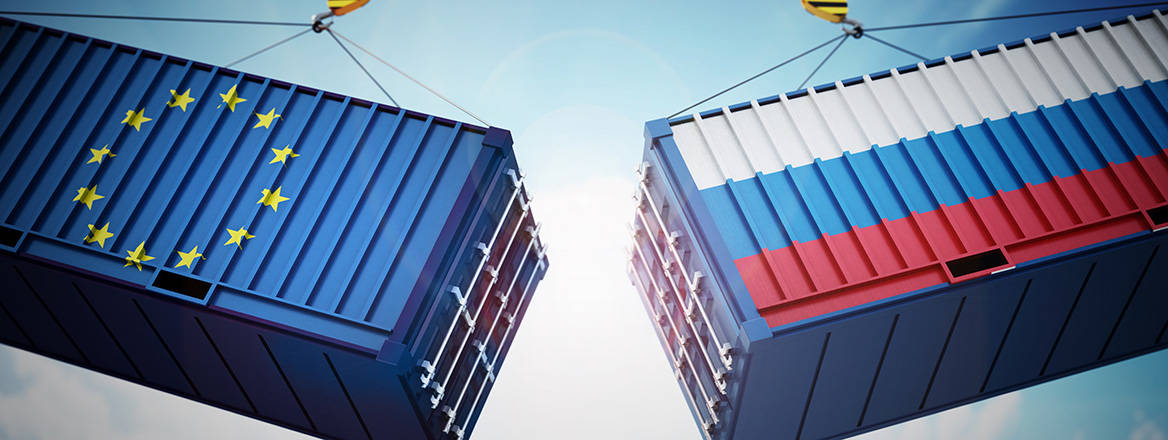Time to Act: Mobilising EU Sanctions against Facilitators of Circumvention
The EU needs a step change in its approach to sanctioning third-party actors that it reasonably suspects of facilitating the circumvention of Russia sanctions. A solution is at hand.
Nearly two years since the beginning of Russia’s full-scale invasion of Ukraine, countering sanctions circumvention remains a major challenge. By one estimate, almost half of Russia’s imports of battlefield items in the first ten months of 2023 ultimately came from manufacturers based in jurisdictions that have imposed sanctions. Cracking down on those who facilitate the circumvention of EU sanctions is no easy task, and member states and EU institutions have been grappling with various approaches, somewhat undecidedly. As concerns about the effectiveness of sanctions grow, and sanctions targets continue their efforts to bypass sanctions, the pressure to deliver in the fight against circumvention will increase. But the EU could do much more immediately, using existing sanctions tools, with minimum policy effort or administrative cost.
Preventing EU Sanctions Circumvention: Internal and External Efforts
EU companies and companies operating in the EU are expected to implement policies and procedures to identify and evaluate their sanctions risks. It is prohibited under EU law to ‘knowingly and intentionally participate in activities the object or effect of which is to circumvent sanctions’. To prevent efforts to evade these prohibitions, the private sector undertakes risk-based due diligence, looking at various factors related to a proposed transaction or activity. On the frontline of EU sanctions compliance, these companies are the gatekeepers against third parties seeking to facilitate or provide material support to the targets of sanctions.
Authorities across the sanctions coalition frequently alert the private sector to the current heightened risk of sanctions circumvention, identifying red flags to help companies detect and prevent such conduct. In evaluating such risk indicators as part of its sanctions due diligence, the private sector uses a reasonableness or ‘high probability’ standard.
Externally, the EU has dedicated significant effort to sanctions diplomacy in relation to its Russia sanctions. These initiatives seek to incentivise third countries to align with EU sanctions and prevent circumvention through their jurisdictions.
In addition, the EU has several deterrence tools to enforce its prohibitions on third-party participation in circumvention schemes. For example, under the Russia sanctions programme, the EU may impose individual sanctions (asset freezes and travel bans) on facilitators on the basis of a series of indicators of circumvention risk. However, to date, EU sanctions against facilitators of Russia sanctions circumvention have been scant.
Criteria for Designating Entities under Anti-Circumvention Provisions
Under Article 3(h) of Council Regulation 269/2014 (‘the Regulation’), the Council of the European Union (the Council) may impose sanctions on legal persons and individuals for: ‘facilitating infringements of the prohibition against circumvention of [EU sanctions against Russia]’ or ‘otherwise significantly frustrating those provisions’. When it introduced these new legal grounds on 23 June 2023, the Council specifically noted that circumventing EU sanctions against Russia or ‘otherwise significantly frustrating’ sanctions by third-country operators could ‘undermine the purpose and effectiveness of’ EU sanctions.
Setting a foreign policy objective to crack down on circumvention, the Council further noted in its decision that ‘indications of cases of frustrating’ EU sanctions included, ‘inter alia’,
[T]he fact that the main activity of a third country operator consists of purchasing restricted goods in the Union that reach Russia, the involvement of Russian persons or entities at any stage, the recent creation of a company for purposes related to restricted goods reaching Russia, or a drastic increase in the turnover of a third country operator involved in such activities.
In other words, the Council listed several non-exhaustive red flags for identifying ‘cases of frustrating’ EU sanctions that could lead to the listing of entities or individuals. This approach resembles the methods used in the private sector to detect and prevent circumvention risks.
A structured EU approach to circumvention-related listings would allow greater and swifter cooperation between member states and EU institutions
In its 11th sanctions package in June 2023, the Council sanctioned Russia-based entity SPS CJSC on grounds of ‘frustration of sanctions’. The Council took the view that SPS CJSC, a manufacturer of computers and other electronic equipment, was actively involved in circumventing sanctions through a partnership with EU-based entity Woerd-Tech BV. The Netherlands-based Woerd-Tech BV was suspected of smuggling semiconductors into Russia and the owner was arrested by the competent Dutch authority on suspicion of circumventing sanctions, with SPS CJSC believed to be functioning as a ‘key facilitator’. In the 12th package, the Council sanctioned a French national on facilitation grounds for using two Finnish companies, Siberica Oy and Luminor Oy, to export sanctioned products to Russia. The Council cited as a justification that the individual is being prosecuted by Finnish authorities for violating EU sanctions. The EU also sanctioned two Russian entities, LLC Mayak and AK Microtech, and one of their managers, on grounds of frustration of sanctions (for running ‘parallel import’ schemes).
By looking at risk indicators, the Council in effect adopted in these cases a ‘reasonable suspicion’ or ‘reasonable cause to suspect’ standard to list an entity for facilitation of circumvention or frustration of EU sanctions. As a sanctioning authority, the EU does not need direct evidence of circumvention to sanction entities for these reasons. It is sufficient for the Council to reasonably suspect – including through using red flags – that the target engaged in circumvention, facilitation or acts that significantly frustrate EU sanctions.
To address the pressing need to step up enforcement actions against facilitators of circumvention, the EU should now embrace the full potential of this approach.
The Benefits of the ‘Reasonable Suspicion’ Approach
Article 3(h) of the Regulation allows the EU to impose sanctions on circumvention grounds using a standard of ‘reasonable suspicion’, informed by red flags. The EU should now deploy the full potential of that instrument for four main reasons.
Firstly, using a list of risk factors would enable the Council to rely on a set of objective criteria to make a subjective assessment (of whether it has a reasonable cause to suspect facilitation). The EU policy cycle would thus be able to rely on a common framework to identify and evaluate whether to impose, on a discretionary basis, sanctions on third-party actors for facilitation of circumvention or frustration of sanctions. Circumvention listings have minimal impact on EU domestic interests and thus should not raise political concerns. On the contrary, as an enforcement tool they reinforce the effectiveness of measures already adopted, and could produce tangible results.
Secondly, the designation files could be built using open source intelligence. It is relatively easy to gather data and perform basic due diligence on entities, looking at corporate information where available (its absence could be a red flag in itself), customs data, shipping, fleet activity, media, web presence, and other information or reports. Beyond these sources, the EU could develop its own typology of red flags (including and beyond those already included in the Council’s decision and Commission guidance) and of factors to consider for circumvention designations – relying, where helpful, on EU delegations or member states’ diplomatic representatives in third countries. It could also include data from the EU Sanctions Whistleblower Tool.
Thirdly, this approach would allow agile multidimensional cooperation. A structured EU approach to circumvention-related listings would allow greater and swifter cooperation between member states and EU institutions. Member states could easily feed into the process, for example with reports, investigations or enforcement actions from their jurisdictions. The approach would also facilitate information sharing (beyond the intelligence realm) among partners and allies. Externally, effectively using Article 3(h) would give additional leverage to the EU’s sanctions diplomacy.
Every conclusion of the European Council since March 2022 has called for action to prevent and counter circumvention of EU sanctions against Russia
Fourthly, the approach would offer a new angle for collaboration with the private sector. The private sector has to make complex decisions on non-sanctioned entities that nevertheless present heightened sanctions risks. Pointing to the risk that the EU might sanction such entities for facilitation of circumvention or frustration of EU sanctions would help companies decline certain transactions. Conversely, the risk of being sanctioned by the EU on these grounds would further incentivise compliance by third-country operators. To argue a de-listing application, an entity alleging that it was wrongfully sanctioned on such grounds would have to show, among other things, that it was in fact not circumventing or frustrating EU sanctions.
The Way Forward
The EU should develop a common methodology to identify entities or individuals that could be designated under Article 3(h). The methodology could be proposed by EU institutions with input from member states to ensure a consistent approach, so that states could feed their own findings into the process (in parallel with an investigation or enforcement action). It could be developed with partners, beginning with the G7+, so that targets could be sanctioned by several regimes.
Introducing sanctions compliance techniques into the common methodology for designation under Article 3(h) could help the EU overcome some of the structural problems of its sanctions framework, while increasing agility and sanctions activity. It would also be an opportunity for the policy cycle to learn from the private sector, which has been at the forefront of implementing complex sanctions in tumultuous times. Such designations would also help the private sector’s own compliance efforts. Moving forward, the EU should consider employing similar tools in other sanctions programmes. For instance, compliance techniques could be used to crack down on illicit finance networks or facilitators thereof (such as under the new Hamas–Palestinian Islamic Jihad sanctions programme).
This roadmap for making circumvention designations based on compliance concerns presents an opportunity for high reward for little risk. Every conclusion of the European Council since March 2022 has called for action to prevent and counter circumvention of EU sanctions against Russia. The European Parliament’s 9 November 2023 resolution likewise called for more action. The mandate for action is compelling, and there is no need to wait for the next sanctions package. Designating actors using this approach does not require achieving a complex consensus among member states on a new bundle of measures – a process which brings significant delays.
The EU has already laid the policy and legal grounds to pursue this approach. The sooner it embraces its full potential, the more effective the EU’s sanctions will be.
The views expressed in this Commentary are the authors’, and do not represent those of RUSI or any other institution.
Have an idea for a Commentary you’d like to write for us? Send a short pitch to commentaries@rusi.org and we’ll get back to you if it fits into our research interests. Full guidelines for contributors can be found here.
WRITTEN BY
Jan Dunin-Wasowicz
RUSI Associate Fellow, CFS
Gonzalo Saiz Erausquin
Research Fellow
Centre for Finance and Security
- Jim McLeanMedia Relations Manager+44 (0)7917 373 069JimMc@rusi.org



